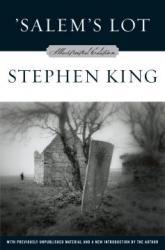
One of King's most famous books, Salem's Lot is a story about vampires that doesn't exactly rival King's other books in terms of plot and suspense. However, it's still a great book that is very enjoyable. The book is about a vampire that eventually turns the entire town into vampires themselves, and a small group consisting of a doctor, a priest, a writer, and a little boy all fight back against the outbreak. The book does a good job of building up the villain and the characters, but the horror is not exactly the preliminary theme here. Instead, it is more focused on the drama and action, which is fine, but for an author who is famous for his horror novels, this book was slightly underwhelming. However, I would still recommend it to Stephen King fans or anyone looking for a good book.
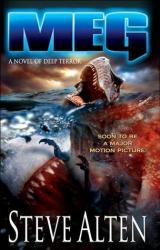
While Jaws may have terrified readers with it's suspense, Meg follows in Peter Benchley's footsteps for only a few steps-and then veers off in a completely different direction. This is a novel all about a small group of scientists trying to kill a gigantic megalodon shark after it escapes from it's hovel in the Marianas Trench. It also has a pinch of scientific mumbo-jumbo and horror to draw all sorts of different readers and to keep you hooked. The characters are diverse, likable, and fleshed-out, and the main antagonist, the 60 foot long megalodon shark, is so entertaining to read about. I would recommend this book to anyone who enjoys action, suspense, or sharks!
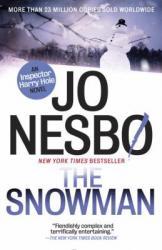
Have you ever heard of Leatherface? Hannibal Lecter? Freddy Krueger? Good. Because if you like those kinds of killers and movies, then you will absolutely love this novel, The Snowman. The book follows the path of a detective with a dark past who is forced to hunt down one of the most deadly and disturbing killers he has ever faced, as he simultaneously struggles with the battle within himself. Overall I thoroughly enjoyed the book. I would recommend this novel to people who enjoy thrillers, horror novels, or anyone who enjoys getting a little disturbed sometimes.
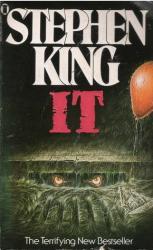
Review: This book is incredible. One of the scariest novels I have ever had the pleasure of reading is also one of the longest. In this book you follow the journey of seven characters - all brilliantly well rounded and fleshed out, if I may add. You alternate between their experiences during childhood and adulthood of facing and fighting the demonic and supernatural clown, Pennywise. I recommend this book to fans of horror and Stephen King, or anyone who enjoys a long read of a good book.
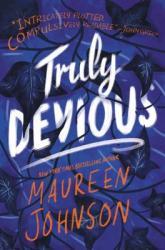
Stevie Bell loves all things crime, true or otherwise. She loves to dive into the fictional encounters of the likes of Hercule Poroit and Sherlock Holmes almost as much as she loves to solve cold cases. So when she gets the opportunity to study at Ellingham Academy, site of one of the most famous unsolved murder/kidnapping cases of all time, she jumps at the chance. She doesn't get too far into her murder investigation, however, when a fellow student is found dead in the same tunnel as a murdered girl from before.
For the most part, this is just a straight-up mystery with a quirky setting and side characters, but it really works. The book goes back and forth from the events of the 1939 Ellingham murders to present day, and I found myself equally interested in both stories. Our main character, Stevie, is extremely likable, and gives us some smart, biting commentary about her life and her classmates along with a lot of interesting tidbits about past crimes and mystery authors. Stevie's classmates all have distinct personalities and are quite the diverse cast of characters. Students at Ellingham are selected for having some sort of ability or interest, and her roommates are an artist, an inventor, a coder, a writer and a YouTube star which makes for some fun interactions and conversation in the group. There's a bit of a meh romance, but it didn't detract from the rest of the book and it will be interesting to see where that heads in the sequel.
The main appeal here is the dual mysteries. Both were a lot of fun to read, and I was dead wrong about the identity of the present day killer which is always fun. Really, the only downside for me was the ending. It ends on a massive cliffhanger, and I actually wish a few things were a bit more tied up. I found it to be jarring and a bit off-putting. That said, I'll probably check out the sequel.
If you are looking for a really solid mystery featuring clever and engaging characters, then this is for you! You can put Truly Devious on hold now - thanks to Edelweiss and HarperCollins for the electronic review copy. If it weren't for that ending it'd be a 4 star read for me, but...3 stars.
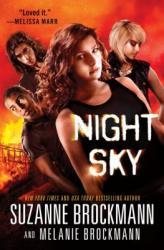
"Night Sky" is a joint effort Between mother and daughter Suzanne and Melanie Brockman. Despite the fact that two different minds worked on this title, It is smooth polished and a well unified work of fiction. This is a fantastic young adult novel that I would recommend well before Titans of the genera such as "Divergent".Within its pages we follow a girl by the name of Skylar who develops from a pent up and unconfident teen with an over bearing mother to a strong young woman with the courage to stand up not only to her mother but also to the shadow organization that orchestrates horrible events the world over that no one will dare defy. Like most young adult novels it has a romantic sub plot that you can see coming from one hundred miles away while facing the other directions with your eyes closed. Thankfully however, this fact does little if anything to detract from the quality of this book. The characters feel real and alive, each with their own personalities. The descriptive language is detailed enough that the world easily paints its self in the readers mind. With elements of horror, mystery, action, fantasy, and romance this is a well rounded first effort from the duo that I recommend wholeheartedly.
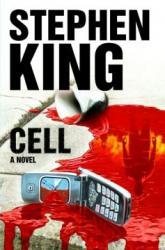
The book "cell" by Stephen king is a book about learning to cope with the apocalypse. The apocalypse in this book is very unique and diverse from your typical zombie virus outbreak. While the main character, Clay, is out getting ice cream he watches as people answer their phones. They all start going crazy after they've answered the call, spitting out nonsense and being extremely violent towards each other. He was the only person there without a phone. Through out the story new characters are gained and then lost. I liked this book because I have a lot of trouble finding books that grab my attention. I really enjoyed reading this book, it was very action filled. There were no dull moments. I chose to read this book because of hype around the movie "It". I really liked the movie so I decided to read some of his other work. I would recommend this book to anyone who like very exciting, sad, emotional, and/or mysterious novels.
Reviewer Grade:9
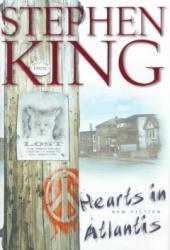
When I started Hearts in Atlantis, all I knew about it was that it was written by Stephen King and there was a movie of the same name that was likely based on it. As I began to read, I found myself enthralled by the coming-of-age story that presented itself. I had no idea it connected to the Dark Tower series, but that detail was almost ancillary, a neat little connection into a bigger picture. Having made it half-way through the book, I wanted to follow the main character’s development into adulthood but, then the story suddenly stopped.
Instead of following a story that had engaged me, the focus shifted to a completely different character, only loosely tied to the events in the first half of the book via one of the characters, who was now in college. Almost in a fractal fashion, this story was half as long as the first, with each successive story growing shorter and shorter, while still being connected to the first narrative in some way, no matter how loose that connection might have been. Finally, the story returns to the main character of the first section, but only stays long enough to say goodbye.
I absolutely loved the first story in this “collection,” and by its strength alone, I would recommend this to anyone. However, the second half of the book felt too disjointed to be interesting, especially with all the emotional energy I had invested in the first story. Sure, they were somewhat interesting in their own ways, showing the relentless march of time toward the modern era, but they simply lacked that fantastical little spark from the first story (incidentally, the same spark that was connected to the Dark Tower series).
A great story with almost unnecessary add-ons, I give Hearts in Atlantis 3.5 stars out of 5.
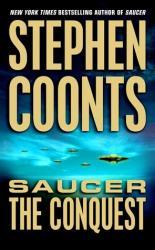
In this Sci-Fi thriller sequel to the first Saucer book in the series, Stephen Coonts brings back ex-air force test pilot Charley Pine, Rip Cantrell, and some new key characters. Charley Pine is hired to fly a french spaceplane to the moon, where she finds a french Millionare by the name of Pierre Artois. Charley soon finds out what Artois and his conniving wife Julie are actually up to. A massive Anti-Gravity gun is stationed on the moon, Pierre and his wife have been planning for years for their ruler ship over the earth. All the while this is going on, Rip's uncle, saucer expert, Egg Cantrell is kidnapped by mad scientist Newton Chadwick and is forced fly him to the moon in another saucer... Rip Cantrell and Ms. Pine find out about this and steal another saucer from a Smithsonian. Soon a fierce battle in outer space takes place. Who will come out on top? This sequel to the first Saucer book should definitely be on everyone's radar. Young or old, this book will leave you all wanting more more every page you turn over!
9th Grade Review
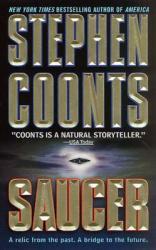
Saucer is an amazing Sci-Fi, Adventure, Thriller, and suspense book.
Stephen Coonts is a very talented Author who uses very good word choice. This is quite evident in his Saucer Trilogy, he seems to use the best wording at the best possible time. This book is definitely a great choice for all 13+ year old Audiences. Young Rip Cantrell is put under difficult circumstances numerous times. When his life and the life of Ex-Air Force Test Pilot Charlie Pine, and his grandfather are at stake, he makes a choice that will change his life from that point on. This Novel brings not only the thrill of life and death so many times, but amazing science fiction story line for us Sci Fi geeks. Obviously this book involves a saucer, Hence the name "Saucer", and this saucer appears to be lodged in that sandstone for over 140,000 years.
Now this saucer isn't made from man, as proven when Rip and his companions explore the object after days of digging it out. Over the course of this book, action escalates quickly, as Rip ends up across the world in Australia trying to save Charlie from the 2nd richest man in the world... Saucer is a stunning, action filled, adventurous book, at what might have been and what be. Go check this book out for yourself! I guarantee you will not be disappointed!
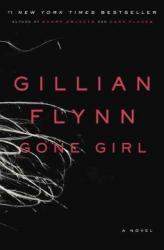
I loved reading this book. I loved everything about how it was written, how diabolical and shrewd the main character, Amy, was. Most of the book had me at the edge of my seat, eagerly lapping up the story as fast as I could. Then I got to the last quarter or so of the book. There came a point where Amy's plans and character changed a little to drastically to be consistent with who she was throughout the majority of the book. And after that, the quality of the writing also noticeably changed, as if a different author with a different writing style picked up where Flynn left off and finished the story from there. And THEN to add further insult to injury, the ending was just terrible, and somewhat unbelievable.
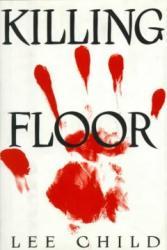
The first book in the Jack Reacher series is certainly a thriller, through-and-through. I certainly can understand its appeal, especially for male readers, since it has plenty of violence and sex while also exhibiting a number of action sequences. Consequently, it felt somewhat “pulpy” in that it was entertainment for entertainment’s sake. Sure, it’s a fun thrill-ride, but certain elements didn’t invest me in the characters. Jack Reacher himself is probably the majority of this issue, as he’s a drifter with little-to-no connections to anything or anyone, merely acting as a conduit to make action/killing happen.
As for the core mystery of The Killing Floor, it was a fascinating premise and had a slow unraveling to keep me intrigued along the way. This was undoubtedly the strength of the book since it was a unique and intriguing twist on a pretty common crime. With a small cast of characters, the plot stayed pretty focused, even if there seemed to be an unusual amount of coincidence that got it there. Even the characters themselves mentioned how coincidental it was, which merely made the fact of these coincidences more obvious. This detracted from my suspension of disbelief.
For the first book in a series, The Killing Floor does its due diligence of hitting all the tropes of the thriller genre and establishing Jack Reacher as a character who could do anything and be anywhere. I’m sure the other installments in the series took advantage of this flexibility, even if I haven’t read them yet. What was somewhat troubling was how the deaths of the people in the book felt real and had real implications and consequences, but Jack Reacher wasn’t affected by much of it at all. If anything, this book establishes Reacher as a sociopath or at least someone who exhibits many traits of one.
A book filled with everything that would appeal to “guys,” I give The Killing Floor 3.5 stars out of 5.
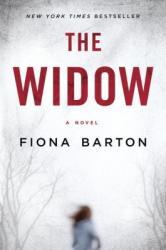
This book is dark, and it addresses most of the situations of what is happening in the present. However it gives the reader another view besides the victims, but everybody that is affected by the circumstances. It is really good, I could not put it down.
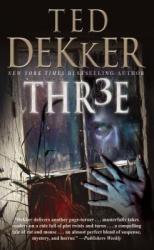
Thr3e by Ted Dekker (great title after reading the book) is one of the greatest murder mystery novels out there. The book begins with the main protagonist, or so it seems, Kevin Parson. He receives a phone call from a psychopath in Killer named Slater saying that he has three minutes to confess his sin to the world or else his car will blow up. This is just one of the many events that take Kevin, Samantha, his greatest friend, and Jennifer, an FBI agent, through a world of mystery and motives. The twists and turns are the main attraction of this novel, as the reader won't expect what comes next. Character backstories also play a gigantic role in this novel, and all of them are well crafted to fit the plot. Anyways, I would recommend it to anyone willing to take the time to read a book.
Grade: 8
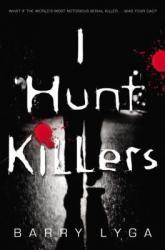
Jasper "Jazz" Dent is the son of the world's most notorious serial killer. After his father was captured, Jazz has just been trying to live like a usual 17 year old. But when a new killer appears who seems to be trying to mimic his father, Jazz knows that it's only a matter of time before people start to believe he's the new killer. So he decides to join the police in tracking down the murderer, not only to convince the town he isn't like his father, but himself. I Hunt Killers has a good mystery, with plenty of twists, and is difficult to predict. However, it isn't the mystery that makes the story addicting; it's Jazz. While some of the minor characters suffer from a lack of proper development, Jazz's interesting (and disturbed) mind makes this book difficult to put down. He is a morally gray character, incredibly messed up, but sympathetic. His fears of being a sociopath are not without reason. In the hands of a different writer, his struggles could be seen as heavy handed or melodramatic. But here, he is written as completely believable. The mystery is a good one, but it's the protagonist (the likes of which you rarely see in a young adult story) that makes this book really good.
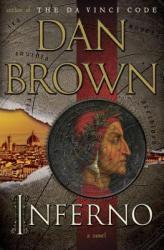
In this, the fourth installment of the Robert Langdon series, Dan Brown has continued to successfully marry science to art, albeit with the same tropes and trappings that occur in the book’s predecessors. With Inferno, we get the same race across Europe explored in Angels & Demons and The Da Vinci Code, with the ambiguity of the antagonist’s motives that fueled The Lost Symbol . All throughout this adventure, the now-standard “female who is an expert in her field” accompanies Langdon as he tries to unravel the mystery and save the world. Langdon continues to be part Indiana Jones and part James Bond, that’s for sure.
Utilizing the standard “temporary amnesia” plot device, Brown refines his style while also increasing the stakes. While previous books in the series had potential impacts on the local and national levels, Inferno takes the antagonist’s plan to a global scale. With the main character as talented with memory as Robert Langdon is, taking away his recent memories was a good way to have him re-learn the situation at the same time the audience does. This also allows for some entertaining twists and turns as characters’ motives are revealed, often taking the plot in a quick 180° turn.
While much of the historical plot of Inferno focuses on the titular work by Dante, the scientific side of the story is incredibly relevant. Previous Brown books like Angels & Demons or The Lost Symbol certainly had some interesting scientific intertwining, but Inferno examines one of the most pressing issues within the scientific community right now. This issue, much like global climate change, has no easy answer, and Brown’s solution through the book’s antagonist is certainly a terrifying answer, even if it is probably the most humane way to go about implementing it.
The best book in the Robert Langdon series to date, I give Inferno 4.0 stars out of 5.
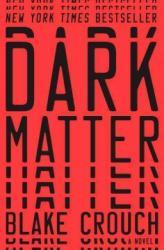
It seems to me that the multiverse is a popular topic in fiction today. Sure, there have been plenty of stories about parallel universes and the fractal branching of our decisions, but for some reason, there’s been an uptick in the number of these stories lately. Perhaps these stories are trying to find a better universe in which to live, or perhaps they’re trying to show us that the world we have could be much worse. Either way, Blake Crouch’s Dark Matter nails the multiverse plot by exploring all the different connotations of the ability to travel between parallel universes.
Presented in a traditional, three-act narrative, Dark Matter thrusts its protagonist into another version of his reality, ripping him away from his idyllic life. Using quantum physics as a form of magical hand-waving, the narrative then turns to the main character’s relentless search for his original universe. While the result of this exploration fits nicely into the book’s natural third act, I almost would have liked to see something a little different and less predictable. Still, all three acts are entertaining as a breathless thriller driven by the emotions and resolve of the main character.
The best part about Dark Matter is how it fleshes out all the consequences of being able to travel between parallel dimensions. It’s not nearly as simple as an It’s a Wonderful Life (1946) “you-never-existed” storyline. That being said, I do question why the “original” main character had the perfect life, especially if many of the other parallel universes seemed to have relatively close representations of the life he was trying to return to.
But, in the end, the narrative is driven by the characters, and these characters are well-developed and exciting to follow.
A multi-dimensional thrill ride, I give Dark Matter 4.5 stars out of 5.
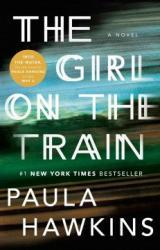
I haven't always been a big fan of mystery, but this book changed that. The Girl on the Train is about a woman with some difficult events in her past who becomes a crucial part in solving a missing person case. This book resembles a psychological thriller, which keeps the level of suspense high. It shows multiple people's perspectives, which makes following the mystery so much more intriguing. I absolutely recommend this book, whether you like mystery or not. Chances are you won't be able to put it down.
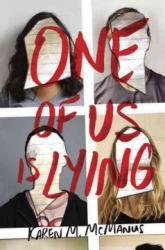
One of Us is Lying is like The Breakfast Club, as it it involves a bunch of "teen movie stereotypes", during an interesting detention. These include Bronwyn, the "brain", Nate, the "criminal", Addy, the "beauty", Cooper, the "athlete", and Simon, the "outcast". However, the similarities end there, as one of them, Simon, dies from a suspicious allergy attack during the detention. Simon was the creator of the gossip app known as "About That," which shared other students' secrets and gossip. He had been planning to post about the other four before his death, making them all suspects in his murder. Or is it all a frameup? The reader has to decide whether one of the incredibly likable four leads is a lying murderer, or if they're all victims.
This book was very addictive. McManus' writing was detailed, and she was able to distinguish the four's voices as their own. No one sounded or felt the same, and each of their narratives were equally enthralling. Each lead character is a deconstruction of the stereotype they're based off of, and in a way, this is a deconstruction of the mystery genre in general; unlike most, it's more character driven than plot driven.
My main complaint is that some of these students seem overly capable in a way. Not just the four, but the supporting character's talents are beyond most high schoolers. It may have made more sense if the setting was in college. However, this is something I see a lot of in YA fiction today, so it doesn't overly bother me, and it didn't lessen my enjoyment of the book.
I recommend this if you like mysteries and character driven stories where every character, both leading and supporting, are developed, fleshed out characters.
Reviewer Grade: 12
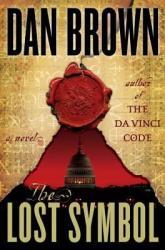
After Dan Brown’s previous entries in the Robert Langdon series had covered the Illuminati and the Catholic Church, respectively, his next target in The Lost Symbol was the Masons. Unfortunately, as both National Treasure (2004) and its sequel, National Treasure: Book of Secrets (2007), were released before this book came out, the setting and concept seemed derivative in The Lost Symbol. Especially with the focus on the Masons’ “treasure” for the better part of the book, I was half expecting the chase to be on a larger scale than just hopping from one Washington D.C. monument to the next as the puzzle unfolds.
In a bit of a combination of Angels & Demons and The Da Vinci Code, The Lost Symbol combines the exciting twists of uncovering the secrets of a Masonic pyramid with the pseudoscience of Noetics. Of course, the plot could have omitted everything about Noetics, and it would have stood just fine on its own, so I question why it was even needed at all, except for some familial drama and a series of wordplays near the end of the book. In my mind, the puzzle-solving element brought over from The Da Vinci Code was much stronger than the “science” brought over from Angels & Demons.
As for the book’s antagonist, I initially felt he was merely formulaic to the other enemies from previous Robert Langdon books. After all, when you have a self-motivated Illuminati Agent in Angels & Demons and an albino religious zealot in The Da Vinci Code when you have a tattooed Masonic muscleman as the antagonist in The Lost Symbol, you start to see the similarities. At least this time the antagonist had a great twist near the end. However, like some of the other “twists” in this book, if you were paying close enough attention, you would have figured it out before its reveal.
A procedural combination of the previous two books in the Robert Langdon series, I give The Lost Symbol 3.5 stars out of 5.


